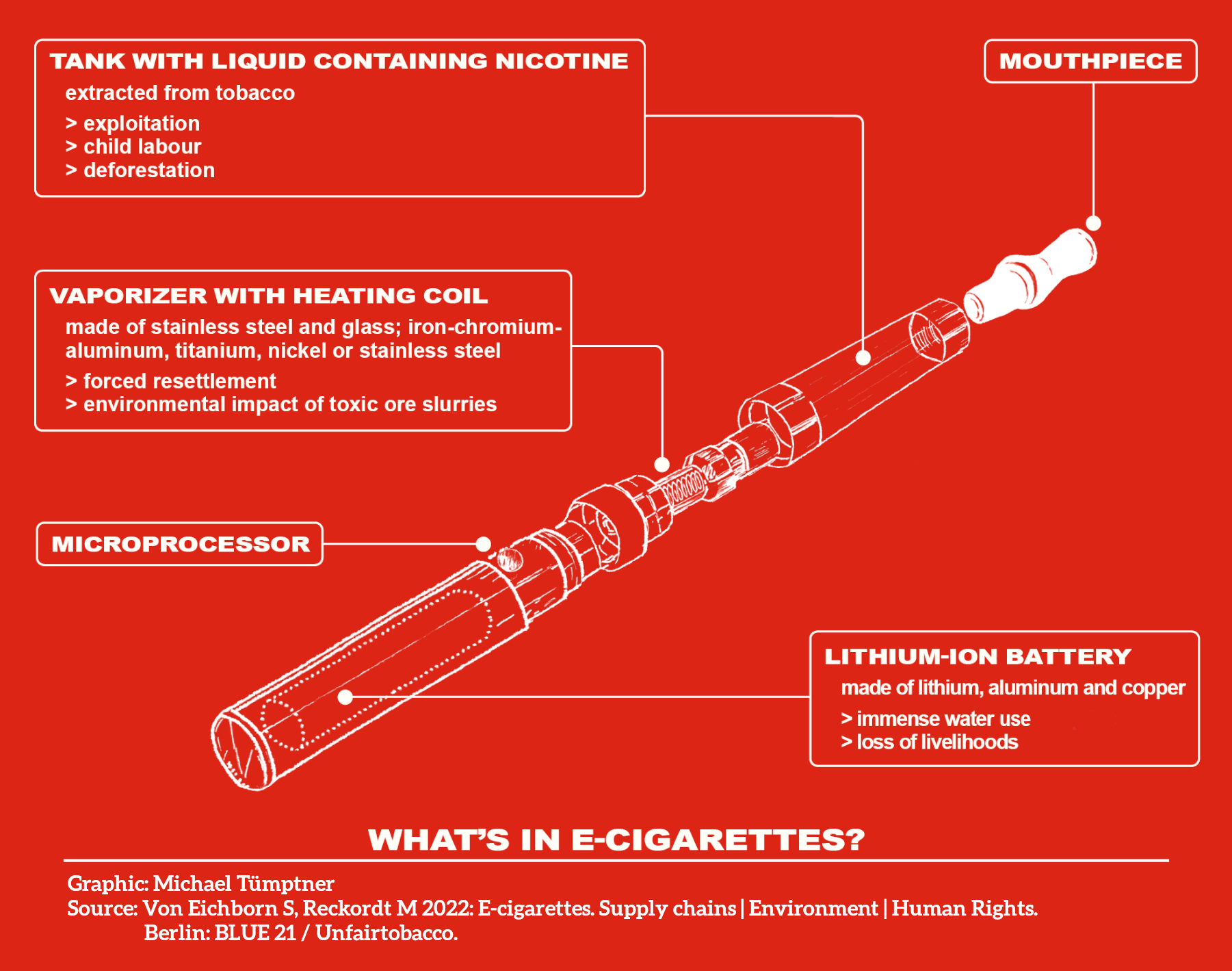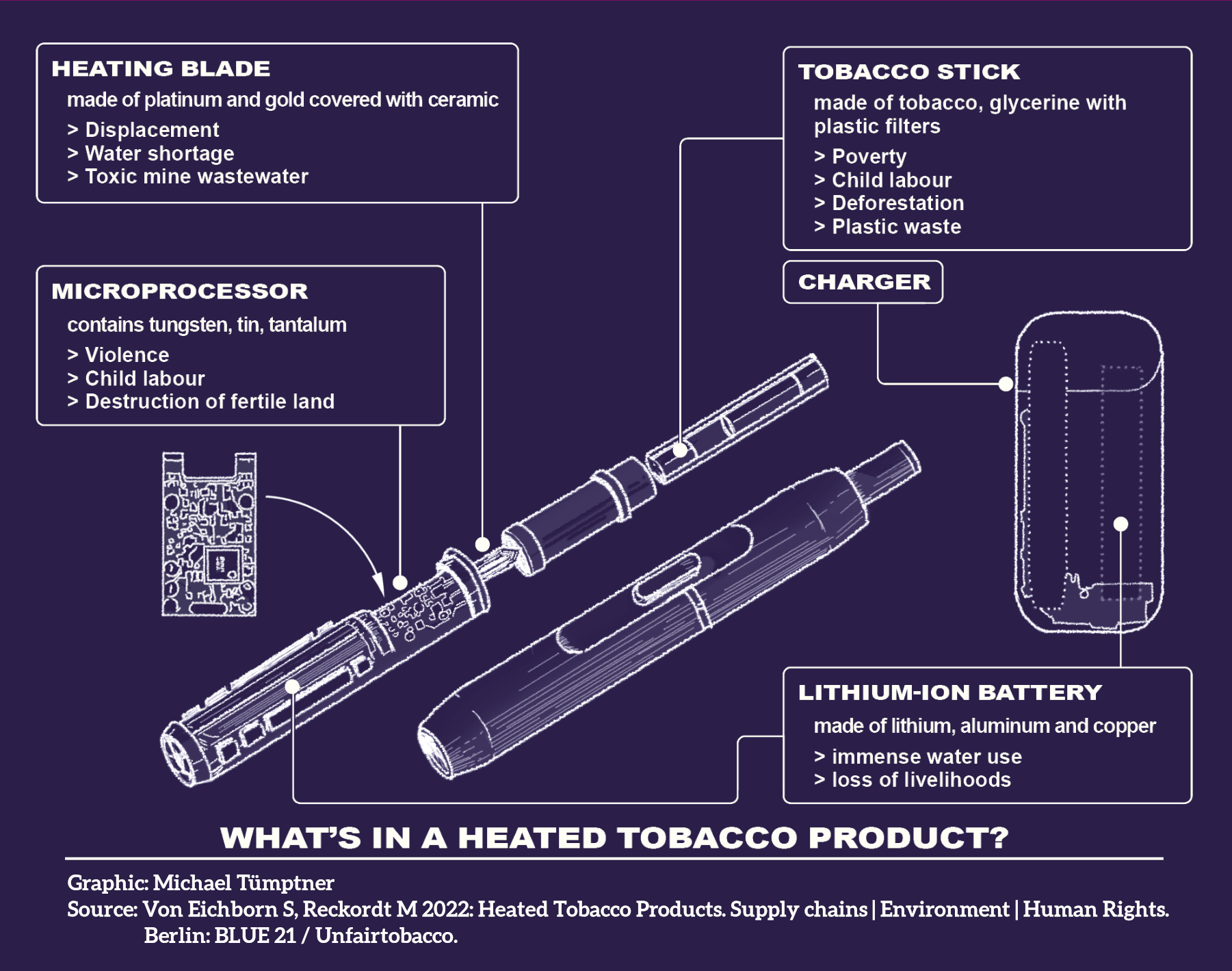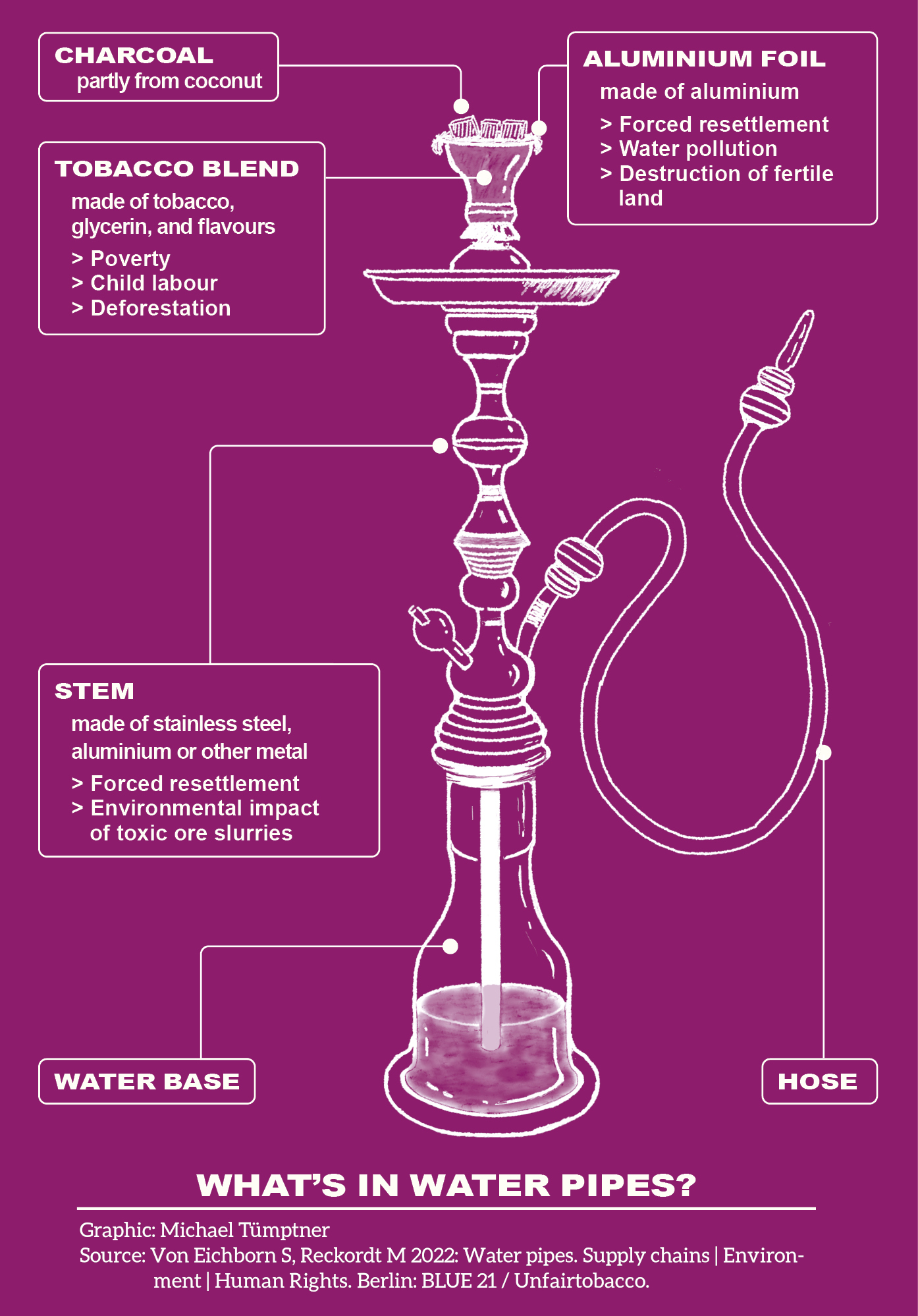World No Tobacco Day 2022: Tobacco – a threat to the environment
We explain how the tobacco industry poisons soils and waterways, destroys forests and damages the climate. Prepare now for World No Tobacco Day 2022 with our material.
Read moreUnfairtobacco and PowerShift jointly publish three factsheets on the supply chains of e-cigarettes, heated tobacco products and water pipes. They take a closer look at the circumstances and effects of extracting resources like lithium, copper and bauxite. They consider tobacco control, corporate due diligence and a raw material transition as fields of action.
The supply chains of e-cigarettes and other nicotine products are far more complex than the supply chains of conventional cigarettes. They do not only contain tobacco or extracted nicotine. Electronic products contain numerous raw materials that have to be extracted by mining. Microprocessors, for example, contain so-called conflict minerals, i.e. tungsten, tin, tantalum and gold. Lithium-ion batteries provide the energy for e-cigarettes and heated tobacco products (HTPs). They contain lithium, copper and bauxite (aluminium). The mining of these three minerals will increase sharply in the coming years due to the push for electromobility.
In order to advance sustainable development, measures to reduce the consumption of tobacco and nicotine products are needed as well as law for mandatory corporate due diligence and a transition in the government’s raw materials strategy.
The factsheet on e-cigarettes focuses on lithium mining in the Andean region of South America. LIthium mining uses enormous amounts of water in areas with fragile ecosystems characterised by water scarcity. In addition, the rights of indigenous communities are massively violated, as mining deprives them of their livelihoods.
Of particular concern is the trend towards disposable e-cigarettes, which can be observed not only in Germany. Just like refillable e-cigarettes, disposable e-cigarettes are powered by lithium-ion batteries. These batteries are thrown away with the device. Thus, rechargeable batteries are simply not recharged and reused. Moreover, according to waste management associations, this e-waste is usually not recycled, but simply discarded into the residual waste.
According to industry figures, 5 million disposables are imported into Germany every month. They account for about 40% of the e-cigarette business. Assuming a content of 0.15 grams of lithium per disposable e-cigarette, these imports contain 750 kilograms of lithium. This would be enough to produce 250,000 batteries for smartphones.
The factsheet on heated tobacco products addresses, for example, the use of platinum in the heating blade, conflict minerals in the microprocessors and iron ore for stainless steel product parts. The focus, however, is on copper, which is considered one of the forgotten raw materials in lithium-ion batteries. In one of the HTP devices copper wire is used to heat the tobacco.
Copper mining takes place mainly in Chile, Peru, the Democratic Republic of Congo and China, but also in the Philippines. Washing the ore out of the rock requires a lot of water and involves the use of chemicals that poison the environment around the mines. The high concentration of heavy metals in the deposits and the resulting polluted mine wastewater threaten drinking water and groundwater and are a major health hazard for humans and the environment.
Water pipes (shishas / hookahs) also contain raw materials, for example in the stem made of stainless steel or aluminium. Shisha smoking also requires aluminium foil, which is placed between the tobacco and the charcoal. The focus of the factsheet on water pipes is therefore bauxite, the raw material from which aluminium is processed.
The bauxite used in Germany is almost exclusively imported from Guinea in West Africa, where the world’s largest bauxite reserves are located. Mining is accompanied by forced resettlement, heavy dust pollution and water contamination, as well as the destruction of fertile land.
Even if the amounts of lithium, copper or bauxite in the individual devices and accessories are comparatively small, they too have negative impacts on sustainable development. They are associated by violations of human rights and massive environmental destruction. For sustainable development, it is therefore necessary to reduce or completely prevent these impacts.
Effective tobacco control measures serve to reduce tobacco and nicotine consumption and to protect children and young people from the dangers of addiction. For example, tax increases, a comprehensive advertising ban and prevention programmes specifically tailored to individual target groups are particularly effective.
Companies must be effectively obliged to better protect the environment and enforce human rights in global supply chains. This requires a tightening of the German Supply Chain Act and a strong supply chain law at the European level.
For a sustainable development respecting the planetary boundaries, however, it is not enough to improve the supply chains of raw materials. Instead, it is urgently necessary to initiate a raw materials transition and to significantly reduce the extraction of raw materials. This requires a comprehensive circular economy and a ban on products that cannot be used in the circular economy, e.g. disposable e-cigarettes.
"What’s concerning about lithium is the social and environmental impact of its extraction. Who is benefitting and who is paying the cost?" (Thea Riofrancos)
Downloads
Factsheets
E-Cigarettes: Supply Chains | Environment | Human Rights
Heated Tobacco Products: Supply Chains | Environment | Human Rights
Water pipes: Supply Chains | Environment | Human Rights
Cigarettes: Supply Chains | Environment | Human Rights
Graphics
What’s in E-Cigarettes?
What’s in a Heated Tobacco Product?
What’s in Water pipes?
What’s in Cigarettes?


